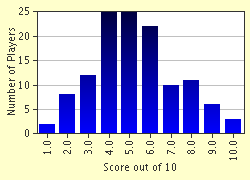Quiz Answer Key and Fun Facts
1. In the word "panorama" what is the suffix ending?
2. What suffix means "resemblance"?
3. The Greek suffix "-lite" means stone.
4. Which of these suffixes means "one who solves"?
5. The suffix "-phobia" refers to a fear or dread of something. Look carefully at the choices and decide which phobia is NOT a true fear.
6. Upon reading the word "euphoria" what do you think the suffix
"-phoria" means?
7. The suffix "-logy" means which of these?
8. What suffix would you use to show that someone has a strong feeling for, or had a love for something?
9. If I want to "watch, look at, or spy" I would use which suffix?
10. Which of the following suffixes forms nouns and means "the act, state, or theory of"?
Source: Author
57wordsmith
This quiz was reviewed by FunTrivia editor
bloomsby before going online.
Any errors found in FunTrivia content are routinely corrected through our feedback system.


